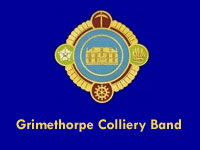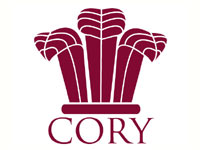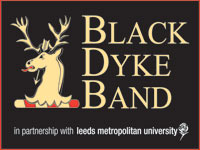Brass Gala Concert
18-Sep-2008Featuring: Grimethorpe Colliery; Cory; Black Dyke Bands
Conductors: Allan Withington, Dr Robert Childs, Dr Nicholas Childs
Symphony Hall, Birmingham
Sunday 14th September
A near capacity audience gathered at Symphony Hall the day following the Open, 80% of whom had not attended the contest itself, showing the continuing popularity of this annual event.
The three bands had chosen contrasting programmes which complemented each other well, incorporating classics from the past, challenging contemporary works and entertaining lollipops.
 Grimethorpre Colliery
Grimethorpre Colliery
Grimethorpe opened the proceedings, with Alan Withington explaining that they were presenting the programme they had given at the European Championship in Stavanger, which had been chosen by an internet poll, commenting that if the audience didn’t like it they couldn’t blame him or the band!
Somewhat unusually, but very effectively, they commenced with Percy Grainger’s setting of the “Irish Tune from County Derry”, as featured in the film “Brassed Off”. With sonorous basses underpinning the band’s warm sound, the playing was full and well-balanced. Soprano and three cornets entered just before the start of the second verse and stood at the front of the stage for their quartet, and there was a massive crescendo in the third verse before the music gradually faded once more.
Exemplary
This was followed by Shipley Douglas’s contest march “Mephistopheles”, featuring an exemplary solo from Roger Webster. The articulation and definition was excellent throughout the band, with a well-defined bass solo, mellow horns and brightness of tone from the cornets and trombones. Dynamic contrasts were particularly well marked, with the abruptness of the changes adding greatly to the effect.
Labour and Love
“Labour and Love”, written in 1913, was the first original composition commissioned for the National Championships. The informative programme notes described the story behind this tone poem of the industrial age, with its depiction of grim working conditions, murmuring discontent, the withdrawal of labour, the pleading of a desperate wife and the subsequent return to work.
There was commanding solo work across the band, particularly from horn, cornet, euphonium and trombone, with sensitive accompaniments never overwhelming the solo line, as the reading effectively conveyed the various moods depicted. Unison work by the two tenor trombones, followed by the full section in harmony was most impressive.
Deserved ovation
All three bands had selected euphonium players for solo items, the first falling to Michael Dodd with John Hartmann’s “Variations on Rule Britannia”. Having demonstrated his clear, resonant tone in the introduction, a fluent cadenza led into the main theme. Thereafter, the variations were dispatched with alacrity, never losing the shape of the melody and with a wide dynamic range, not to mention a few additional notes at both extremes of the register, earning a well-deserved ovation from the appreciative audience.
Contrast
In contrast, the “Elegy from A Downland Suite” (John Ireland) was distinguished by some fine, sustained playing, with long phrases and smooth articulation, an excellent demonstration of fine tutti playing where no one player stood out from the ensemble.
Introducing their final programmed item, Dean Goffin’s “Rhapsody in Brass”, Alan Withington said that he hoped the audience would enjoy the rest of the concert . . . but not as much as Grimethorpe’s contribution!
Clearly defined
The opening was marked by clearly defined cornet figures and a jaunty euphonium, with flowing scales being interspersed with solid chords across the band. Alan’s unfussy conducting seemed to add to the clarity of the band’s playing, and horn and euphonium made effective contributions, as did the basses in the delicately-placed chords which closed the central section. The final section was marked by some thundering runs, and topped off by the excellent work by Kevin Crockford, on top form throughout the programme.
Encore
The audience were clearly hoping for an encore and Grimethorpe did not disappoint, giving a blistering account of “MacArthur Park” (Webb arr Catherall). There was some impressive interplay between horns, flugel and baritone, and the percussion were at last given their head, driving the music forward, topped off once again by Kevin’s soprano.
 Cory
Cory
After a brief pause while the stage was reset, it fell to Cory to bring the most challenging music of the afternoon, both for listeners and players, commencing with “Peel Park” from “A Lowry Sketchbook” (Philip Wilby).
With cornets starting off either side of the band and trombones in the centre, they presented a kaleidoscope of sound as the various themes competed with one another, with committed glissandi from the trombones and confident work from the percussion section. One could readily picture the hustle and bustle of one of Lowry’s paintings, with those matchstick men milling around.
Welsh and Irish
This was followed by their solo item, David Childs opting for Paul Lovatt-Cooper’s “Neath the Dublin Skies” – this causing a little confusion as Robert Childs had just announced they were introducing a Welsh touch to the proceedings!
The solo, the first of three pieces by the composer to be featured during the afternoon, was written to showcase David’s formidable talent, incorporating both slow, reflective sections and lightning fast jigs. After the sustained opening, in which the soloist was backed initially by a quartet of cornet, horn, euphonium and bass, the jig first appeared unaccompanied before the band joined in and the tempo increased.
A multiphonic interlude caused some amusement to many in the audience, and David produced a controlled sound throughout, as he moved between the backing quartet and the full band, and as the music was wound up to a seemingly impossible pace. Even when the occasional high note did not quite go to plan it did not seem to faze either David or the band as the music moved to its exhilarating finish.
Jenkins interlude
The band then presented two items from the pen of Welshman Karl Jenkins: “Palladio” (arr Tony Small) demanded – and received – great clarity from the band, with repeated notes occurring in both melody and accompaniment, and carefully judged crescendi and diminuendi.
This was followed with an arrangement of “Abide with Me” that Karl Jenkins prepared for the recording that Cory shared with the male voice choir “Only Men Aloud” (singing under the name “Cantorian” as EMI felt their proper title would be off-putting to female shoppers !!!). The setting displayed well the wide range of colours available to the band and provided a calm interlude before their final item.
Devoured
Gareth Wood succeeded John Pickard as Composer in Residence with Cory Band, and both composers’ works have been included at Birmingham over the years. “Actaeon” is based on the Greek myth in which a huntsman (Actaeon) comes across the goddess of the hunt bathing naked in a stream, whereupon she turns him into a stag and he is devoured by his own pack of hounds.
Prior to the performance Robert Childs outlined the programme and the various sections of the piece, and this explanation undoubtedly made it more accessible to the audience, although it did evoke some laughter at the prospect of the beautiful princess being portrayed by a euphonium melody (glancing at David as he spoke). The music passed through a wide range of emotions and styles, with solos for horn, flugel and euphonium, as well as for each of the tuba players, particularly at the point where Actaeon is gradually transformed into the stag.
The contribution of the trombone section was particularly vivid at times, and great demands were placed on the whole band, right up to the somewhat abrupt ending – not a happy one, as Robert had pointed out. Although perhaps not the sort of music that most of the audience were used to, nevertheless it was well received and, as Robert Childs remarked during the interval, “a whole afternoon of lollipops would not do anyone any good”.
Welsh encore
Gareth Wood’s versatility was then demonstrated by Cory’s encore, an arrangement of “Men of Harlech”, hot off the press and receiving its premiere performance. The familiar tune received a very varied treatment, with distorted rhythms and syncopations, including xylophone and trombones in close canon, before ending in Latin American style.

Black Dyke
Third to play, but by no means last in terms of quality, came Black Dyke, opening with their signature march “Queensbury”, played with their customary attention to detail, with precise rhythms, a sparkling cornet solo from Richard Marshall and incisive work from the trombones.
Mozart
Moving on to their published programme, they demonstrated their versatility in Bram Gay’s arrangement of “Overture to the Magic Flute” (Mozart), lightening their tone accordingly, and with the frequent accents being kept within the context of the work. The reprise of the opening – which was almost pre-empted by audience applause – was dominated by the trombone section’s full and majestic sound, and the solo passages were despatched neatly.
Thornton Fantasy
David Thornton was the last of the afternoon’s soloists, presenting “Fantasie Originale”, a solo developed by Sousa’s euphonium soloist Simone Mantia based on music by Picchi. David set out his stall from the outset, with a confident opening and clean arpeggios and octave leaps, whilst the band’s accompaniment was first class, at no times dominating the soloist, and neatly fitting in with the brief cadenzas and his use of rubato.
There was an amusing moment at one stage when he turned the instrument over and peered at it, as if it had failed to perform as it should, and his multiphonic interlude, although only brief, was quite spectacular.
Bach
Nicholas Childs paid tribute to the talents of Howard Snell as he introduced his transcription of Bach’s “Air from Suite No 3”.
For this performance, the cornets were split either side of the band, with Alex Kerwin on flugel and Richard Marshall on cornet standing further back, one wither side of the basses. The melody moved around the ensemble, and the unison passages between Alex and Richard had an almost magical quality.
PLC finish
Introducing “Vitae Aeternum”, Nicholas Childs took the opportunity to promote the new recording of Paul Lovatt-Cooper’s music which had been released the previous day.
“Vitae Aeternum” is based around three Salvationist songs, the composer having been brought up within the Salvation Army, and listing Peter Graham as one of the strong influences on his writing. With the composer wielding the clash cymbals with gusto, the music was full of colour and contrast, from the bell effects on cornets and trombones near the start to the almost ethereal muted rendition of the chorus from “His Provision”, the players turning away from the audience to produce an even quieter sound.
Equally, it was good to see the cornets at the bottom end of the front row being given featured solos, the figures later being taken up by trombone and xylophone.
Organ encore
As the encore to their solo set, Black Dyke turned to the “Toccata from Organ Symphony No 5” (Widor arr Sparke) which had been due to open their programme. This tour de force, taken at a cracking pace, received a virtuoso reading, with ample light and shade and built upon the firm foundation of the Dyke bass section, whose entries replicated effectively the deep organ pedals.
Combined forces
Once Cory had joined Black Dyke on stage the scene was set for the final items, starting with Paul Lovatt-Cooper’s “Walking with Heroes” – and another plug for the new cd! The two bands blended well together, producing a majestic sound as the trombone melody was taken up by the cornet section. Paul’s distinctive writing certainly kept everyone busy in this lively concert opener.
Introducing “Trumpet Blues and Cantabile” (Harry James arr Geldard) Robert Childs explained that he had given his cornet team the option of playing it with or without copies . . . before pointing out that Black Dyke were playing without. As it was, twenty cornet players, including the two sopranos in the centre, were ranged across the front of the stage, producing an exciting, well-balanced sound, whilst the trombones also seemed to be enjoying themselves, bells in the air and with judicious use of slide vibrato.
Finale
For the finale, Robert Childs had produced a new arrangement of Tchaikovsky’s “March Slav”, explaining for the benefit of those who had heard that they were playing “1812” that they should not worry, as the same theme would appear in due course. As the basses entered it could almost have been the massed double basses of an orchestra and the main melody was delivered with due dignity and power, whilst the quieter interludes displayed a delicate touch.
The back row cornets were featured in a powerful trumpeting section, and there were some effective hunting figures on the horns. The eight percussionists, spread out at the rear of the band, made their presence felt, their pounding rhythms complementing the precision of the brass as the music drew to a triumphant climax.
Such a wall of sound would have been difficult to surpass, so for an encore they opted instead for total contrast with a sensitive rendition of Sullivan’s “The Lost Chord” before the audience and bands went their various ways.
Thanks had been given earlier in the afternoon to Bram Gay for his continuing planning of the Sunday concerts, and this year seemed to be one of the best, containing something to suit everyone, and three fine bands in great form.
Peter Bale









